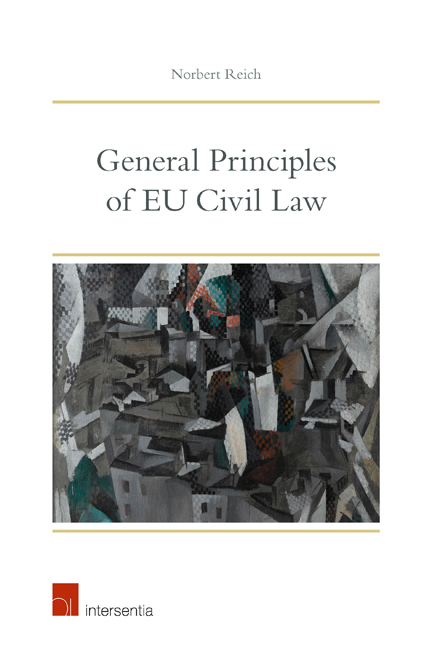Book contents
- Frontmatter
- Preface
- Contents
- Table of ECJ cases: alphabetical
- Table of ECJ cases: chronological
- Table of EU legislation
- List of abbreviations
- Introduction. What are General Principles of EU Civil Law?
- Chapter 1 The Principle of “Framed” Autonomy
- Chapter 2 The Principle of Protection of the Weaker Party
- Chapter 3 The Principle of Non-Discrimination
- Chapter 4 The Principle of Effectiveness
- Chapter 5 The Principle of Balancing
- Chapter 6 The Principle of Proportionality
- Chapter 7 An Emerging Principle of Good Faith and of a Prohibition of Abuse of Rights?
- Summary. Seven Theses and a Conclusion
- Index
Chapter 7 - An Emerging Principle of Good Faith and of a Prohibition of Abuse of Rights?
Published online by Cambridge University Press: 22 November 2017
- Frontmatter
- Preface
- Contents
- Table of ECJ cases: alphabetical
- Table of ECJ cases: chronological
- Table of EU legislation
- List of abbreviations
- Introduction. What are General Principles of EU Civil Law?
- Chapter 1 The Principle of “Framed” Autonomy
- Chapter 2 The Principle of Protection of the Weaker Party
- Chapter 3 The Principle of Non-Discrimination
- Chapter 4 The Principle of Effectiveness
- Chapter 5 The Principle of Balancing
- Chapter 6 The Principle of Proportionality
- Chapter 7 An Emerging Principle of Good Faith and of a Prohibition of Abuse of Rights?
- Summary. Seven Theses and a Conclusion
- Index
Summary
SOME MISUNDERSTANDINGS ABOUT GOOD FAITH IN CONTRACT LAW: ELEMENTS OF A DUTY OF LOYAL COOPERATION IN CONTRACTING
The concept of “good faith” in contract law has been the subject of extensive legal writing in the Member States of the EU. Comparative lawyers usually distinguish between the continental approach where the general clause of good faith is part of the general law of obligations, including contracting, and the attitude in common law, which seems to ignore such a general concept. As a sort of “proof”, Hesselink cites a prominent English judge as having said:
“In many civil law systems, and perhaps in most legal systems outside the common law world, the law of obligations recognises and enforces an overriding principle that in making and carrying out contracts parties should act in good faith […]English law has, characteristically, committed itself to no such overriding principle but has developed piecemeal solutions in response to demonstrated problems of unfairness.”
In this context, it comes as a surprise that the ECJ, in the Messner case (5.9), refers to the “principles of civil law, such as those of good faith”. As far as German contract law is concerned, this is of course nothing surprising, but for an English lawyer it must have been quite shocking and remained unexplained how far this refers merely to applicable, i.e. German, law or EU civil law in general, which is the object of this study. I have tried to limit the impact of this judgment, against the overarching criticism of Hesselink, to the case before the ECJ; in this case the ECJ only authorised the German court to impose upon the consumer an obligation under the German rules of good faith which was not expressly included in the relevant Distance Contracts Directive, but which now has been put into Article 14(2) of the new Consumer Rights Directive 2011/83 (2.1). I am not aware of later references by the ECJ to a general principle of good faith in EU civil law. But of course this would not exclude its autonomous development once EU civil law becomes more coherent and comprehensive.
- Type
- Chapter
- Information
- General Principles of EU Civil Law , pp. 189 - 212Publisher: IntersentiaPrint publication year: 2013



